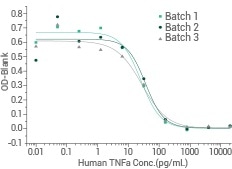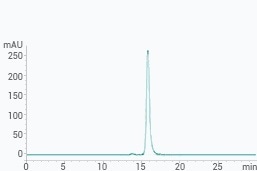Tumor Necrosis Factor-alpha (TNF-α) is a cytokine that acts as an amplifier of inflammation in almost all acute inflammatory responses. TNF-α blockade has been utilized to treat inflammatory disorders such as rheumatoid arthritis all over the world. Clinical trials are also being conducted to see if TNF-α may be used to treat cancer and cardiovascular problems.
TNF-α is a member of the TNF superfamily. Extracellular proteolytic cleavage can unleash proteins from the cell membrane, allowing them to function as cytokines. TNF-αtrimer functions by attaching to the trimeric receptors TNFR-1 (CD120a) or TNFR-2(CD120b). Members of the TNF receptor superfamily include FAS, CD40, CD27 and RANK. TNFR1 signaling is both pro-inflammatory and pro-apoptotic.
NF-κB, mitogen-activated protein kinases, and death signaling are all triggered by it.Other pro-inflammatory cytokines (IL-1, IL-6, GM-CSF, and so forth) may then be activated. TNFR2 signaling, on the other hand, is anti-inflammatory and stimulates cell proliferation. It triggers the conventional NF-κB and PI3K/Akt signaling pathways.
To support in the research of this cytokine, Sino Biological has created a panel of high-quality recombinant TNF-α and receptor proteins.
Recombinant TNF-α cytokines and receptors
Sino Biological has created bioactive recombinant TNF-αcytokines from a variety of species, including humans, mice, cynomolgus, rats, ferrets and canines.
Featured TNF-α protein
Human TNF-α protein: 10602-HNAE
- HPLC-verified
- Low-endotoxin
- High Purity
- Tag-free
Cytotoxicity assay using L929 mouse fibrosarcoma cells in the presence of the metabolic inhibitor actinomycin D. Image Credit: Sino Biological Inc.

Batch-to-batch Consistency. Image Credit: Sino Biological Inc.

>95% as determined by SEC-HPLC. Image Credit: Sino Biological Inc.
Other recombinant TNF-α cytokines
Table 1. Source: Sino Biological Inc.
| Cat# |
Species |
Expressed Host |
Tag |
Purity |
Activity |
| 10602-H01H |
Human |
HEK293 Cells |
N-hFc |
>90% |
Active |
| 10602-HNAE-B |
Human |
E. coli |
Native |
>90% |
|
| 50349-MNAE |
Mouse |
E. coli |
Native |
>98% |
Active |
| 50349-MNAE-B |
Mouse |
E. coli |
Native |
>95% |
|
| 60002-FNAE |
Ferret |
E. coli |
Native |
>95% |
Active |
| 70003-DNAE |
Canine |
E. coli |
Native |
>96% |
Active |
| 80045-RNAE |
Rat |
E. coli |
Native |
>93% |
Active |
| 90018-CNAE |
Cynomolgus, Rhesus |
E. coli |
Native |
>90% |
Active |
| 90330-CNAE |
Cynomolgus |
E. coli |
Native |
>95% |
Active |
| 90330-CNAE-B |
Cynomolgus |
E. coli |
Native |
>95% |
|
Recombinant TNF-α receptors
Table 2. Source: Sino Biological Inc.
| Cat# |
Receptor |
Species |
Expressed Host |
Purity |
Tag |
Activity |
| 10872-H02H |
TNFR-1 |
Human |
HEK293 Cells |
>95% |
C-hFc |
Active |
| 10872-H03H |
TNFR-1 |
Human |
HEK293 Cells |
>90% |
C-hFc & His |
Active |
| 10872-H08H |
TNFR-1 |
Human |
HEK293 Cells |
>92% |
C-His |
Active |
| 50496-M02H |
TNFR-1 |
Mouse |
HEK293 Cells |
>90% |
C-hFc |
Active |
| 50496-M08H |
TNFR-1 |
Mouse |
HEK293 Cells |
>96% |
C-His |
Active |
| 80181-R02H |
TNFR-1 |
Rat |
HEK293 Cells |
>90% |
C-hFc |
Active |
| 80181-R08H |
TNFR-1 |
Rat |
HEK293 Cells |
>95% |
C-His |
|
| 10417-H03H |
TNFR-2 |
Human |
HEK293 Cells |
>95% |
C-hFc & His |
Active |
| 10417-H08H |
TNFR-2 |
Human |
HEK293 Cells |
>97% |
C-His |
Active |
| 10417-H08H-B |
TNFR-2 |
Human |
HEK293 Cells |
>95% |
C-His |
|
| 10417-H08H1 |
TNFR-2 |
Human |
HEK293 Cells |
>95% |
C-His |
Active |
| 90102-C02H |
TNFR-2 |
Cynomolgus, Rhesus |
HEK293 Cells |
>95% |
C-hFc |
Active |
| 90102-C08H |
TNFR-2 |
Cynomolgus, Rhesus |
HEK293 Cells |
>95% |
C-His |
|
| 50128-M02H |
TNFR-2 |
Mouse |
HEK293 Cells |
>95% |
C-hFc |
Active |
| 50128-M08H |
TNFR-2 |
Mouse |
HEK293 Cells |
>97% |
C-His |
Active |
Other related proteins
Antibodies for TNF-α cytokines and receptors